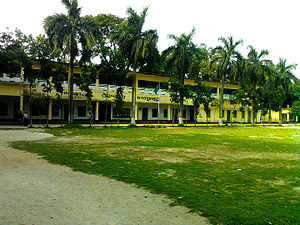Bogra Zilla School (Bengali: বগুড়া জিলা স্কুল) is the oldest high school in the Bogra district of Bangladesh and one of the top-ranked schools in the country. It provides education from class three (Grade-3) to class ten (Grade-10). It was a private English medium school before becoming a public school.[1]
 |
| Bogra Zilla school |
History:
Bogra Zilla School was established in 1853.[2]
Babu
Bhagabati Charan Ghosh was the first headmaster. It was a private
(non-government) school before becoming a public one. It came under
governmental management through the efforts of then magistrate and collector
Mr. Russell and deputy collector Babu S. Mukharjee.[3]
This school observed its 150th anniversary celebration in 2005.
Bogra Zilla School
was the second government high school in the Bogra district during British
rule. Babu Bhagabati Charan Ghosh was appointed Headmaster of the school and
held the post for six years. Bogra's native son Babu Kishoree Lal Roy, who is the
author of many philosophical writings, was an early student of this school. In
his book Free Enquiry after Truth
he wrote, “In 1853 a Government English school was established here and I
obtained my entrance into it. My progress in this institution has been remarked
by its first and best of its Headmasters that ever were, to have been
remarkably rapid. Be it said with deep respect and gratitude that under the
judicious tuition of Babu Bhagabati Charan Ghosh I obtained a useful knowledge
of the English language within about four years and a half. I have always
thought Bhahabati Babu to be one of my greatest benefactors on Earth and will
think so for ever also.”
 |
| Bogra Zilla school |
There were four teachers during the period of Bhagabati
Babu. According to the National School Committee, the school appears to have
beeb founded principally by the sons and relatives of the clerks' officers
connected with the Courts. After Bhagabati Babu, A. C. Mukharjee became
Headmaster in 1859. During his tenure, two students passed in 2nd division, and
one passed in 1st division with scholarship in 1862. Around this time, the
practice of giving books as rewards to the students of both Bangla and English
schools based on their performance was started.
During the prize-giving ceremony more than a hundred taka used to be spent
for fireworks. During 1859–60, the inspector of the schools of the north-east
areas and Assam,
Mr. W. Robinson, conducted the ceremony. He arranged a demonstration with a magic
lantern for their entertainment and showed many interesting and educative
events of nature such as the motions of the stars and planets, a solar and
lunar eclipse, a cyclone, etc. From 1881 to 1885, a school building was constructed
of bricks.
In 1873–74, there were six teachers, one pundit, and one moulavi in the
school. There were 85 students in 1860–61. In 1907–08, the number of students
was 363. Among them, 218 were Hindus and 145 were Muslims.
The school now has 52 faculty members and 4000 students. The
faculty members are graduates from universities in Bangladesh, and student
applicants, mostly from top elementary schools, are put through a competitive
admission selection process.
Location:
Bogra Zilla School is located at the center of Bogra city,
called Shatmatha. It is the nerve of Bogra town. The Circuit House is situated
at the eastern border of the school and a playing ground, named Altafunnesa is
situated in the southern border.
 |
| Bogra Zilla school |
Admission is competitive. Students are admitted into class
three. After an initial screening, more than 2500 applicants appear at a
comprehensive admission test for only 240 positions. There are a few positions
(five to ten) in class four to nine each year. Bogra Zilla School is one of the
best School of Bogra Town and Bangladesh also.
Academics:
This school teaches from class three to class ten. Upon a
screening in class ten, students appear at the SSC examination.
No comments :
Post a Comment